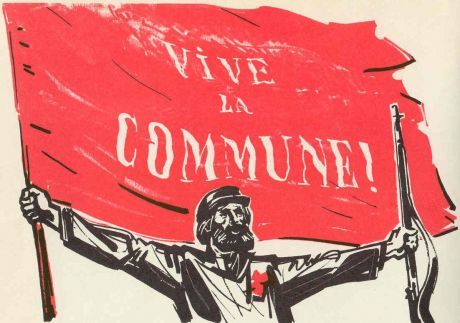Features
You are here
The Paris Commune: revolution in democracy

April 4, 2014
We're in the middle of the anniversary of the Paris Commune, which lasted from March 18 to May 28, 1871, and which left valuable lessons about workers democracy and the state.
The late Tony Benn spent his long political career on the left of Britain’s Labour Party, as often as not slamming the rightward drift of his own party. In public speeches he often repeated that whenever you meet someone in power you should ask these five questions: “What power have you got? Where did you get it from? In whose interests do you use it? To whom are you accountable? How do we get rid of you?”
It was precisely those same questions that faced the revolutionary people of Paris in March and April of 1871. The Parisian working class in 1871 had suffered war, famine and siege by the Prussian army. As France’s Republican government became increasingly discredited, workers got organized. The ruling class wanted to make ordinary people pay for the disaster.
The obstacle for them was Paris and its militant workers organized in the National Guard. “Paris armed was the Revolution armed”, wrote Karl Marx in his Civil War in France. On 18 March the Republican government tried to seize the cannons of the Montmartre area of Paris. Workers defended themselves and soldiers refused to shoot them. After this uprising, the government fled from the city and Paris was left to the working class.
Workers democracy
The Paris Commune–the first ever workers’ government–began. It would end just two months later, in a bloodbath of the workers of Paris. In its short existence the Commune introduced major political and social changes.
Its governing body consisted of workers and their representatives, who received no more than an average working class wage. Crucially, representatives were instantly recallable. The Commune abolished night work in bakeries. All abandoned factories were to be appropriated by workers. It closed down pawn shops.
But, as Marx says, “The great social measure of the Commune was its own working existence”—it was a working class government. Many of its initiatives came from workers’ organizations. Marx argued the Commune was a radical and democratic product of working class self-organization. This remains an important intervention in a debate about the meaning of the Commune. It had proved Marx correct in his belief that the working class could overthrow their rulers and run society itself. But the workers of Paris taught Marx how that could come about. He described the new form of workers’ democracy as “the political form discovered at last under which to work out the economic emancipation of labour”.
The state
Despite this, the Commune left many areas of the capitalist state untouched. Marx therefore also drew important conclusions from its mistakes. The Commune did not press home its advantages at the beginning of its life. The National Guard did not challenge the Republican army and it didn’t confront the centralized state power. It also kept many of the old structures, such as the French central bank. This made it clear to Marx that “the working class cannot simply lay hold of the ready-made state machinery, and wield it for its own purposes.”
The organs of the capitalist state are there to guarantee the continuing exploitation of workers. For instance, it was the army of the Republican state that smashed the Commune. The working class therefore has to abolish all capitalist structures. The Civil War in France was written shortly after the Paris Commune fell in May 1871. But its lessons–about workers’ democracy–remain vital for us today.
Section:









